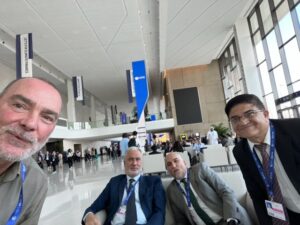COP28 – Day 1: Setting the Table
By SGA Executive Director, Gary Cuneen
I’m reporting here from the COP28 Blue Zone in Dubai, UAE where the opening welcome address will take place in a few hours and where 70,000 people from over 150 countries plan to participate. In preparation for COP28, Chief COP28 Negotiator Wopke Hoekstra met with COP28 President Designate Dr. Sultan Al Jaber to discuss priorities for COP28. They underscored that COP28 must accelerate practical action on mitigation, adaptation, loss and damage and climate finance (new framework and making good on past promise of $100 billion per year) and build a fully inclusive COP28 that leaves no one behind. The UN COP process has been criticized in the past for not inviting to the decision table indigenous rainforest protection advocates.

SGA Executive Director, Gary Cuneen, with delegates from Brazil and Pakistan on the opening day of COP28.
They agreed on the importance of the successful completion of the first Global Stocktake under the Paris Agreement which should mark a turning point on climate action and elevate the next round of NDCs, including clear pathways to achieve emissions reductions, enhance resilience and necessary finance flows. The Global Stocktake Synthesis Report projects a 2.2 degree Celsius increase at current actions and commitments. The Global Stocktake according to the UN will be a Party-driven “inventory taking” process conducted in a transparent manner and with the participation of non-Party stakeholders, enabling countries and other stakeholders to see where they’re collectively making progress toward meeting the goals of the Paris Agreement – and where they’re not.
Another priority that NGOs and the COP28 President emphasized is the need to operationalize the Loss and Damage Fund, including substantial financial contributions by the EU and its Member States. Poor countries have expressed that unless these funds are distributed to support the cost of climate change damage (mostly generated by wealthy nations) and adaptation, they will be hesitant to make concessions related to ghg reduction goals. In addition to the Loss and Damage Fund, there are plans to announce a financial contribution in support of the COP28 Renewable Energy and Energy Efficiency pledge and invites countries to do the same.
Multiple NGOs have weighed in on COP28 priorities, including:
- plans to “phase out” and not phase down fossil fuels;
- financing a low carbon future
- protecting and changing the global food system, which currently some experts estimate contributes to 1/3 of global emissions.
- connecting the climate and biodiversity crisis’ through tangible plans, actions and coordination
- protecting the most vulnerable in the clean energy transition
- accountability
A few other unrelated points worthy of noting are that many analysts state that trillions and not billions annually will be needed to finance the mitigation and adaption to stay with 1.5 degrees Celsius. The Dirty Truth Report states that of the 77 U.S. electric utilities studied (ComEd/Exelon not included), 33 made zero progress on net zero emissions goals and were embarking on greenwashing related to activities that sounded good but did not produce results. Fossil fuel lobbyists, which had an enormous presence at COP27, will continue to advocate for carbon capture during industrial processes as a climate solution at COP28, which many say simply isn’t effective at scale (stay tuned for more on this debate). Lastly, while analysts say that there has been backsliding among the 100 countries who signed deforestation commitments (more trees were being cut down than before and the countries were embracing oil and gas more strongly), Brazil’s new President Lula may emerge as a leader on this issue in this COP28.
